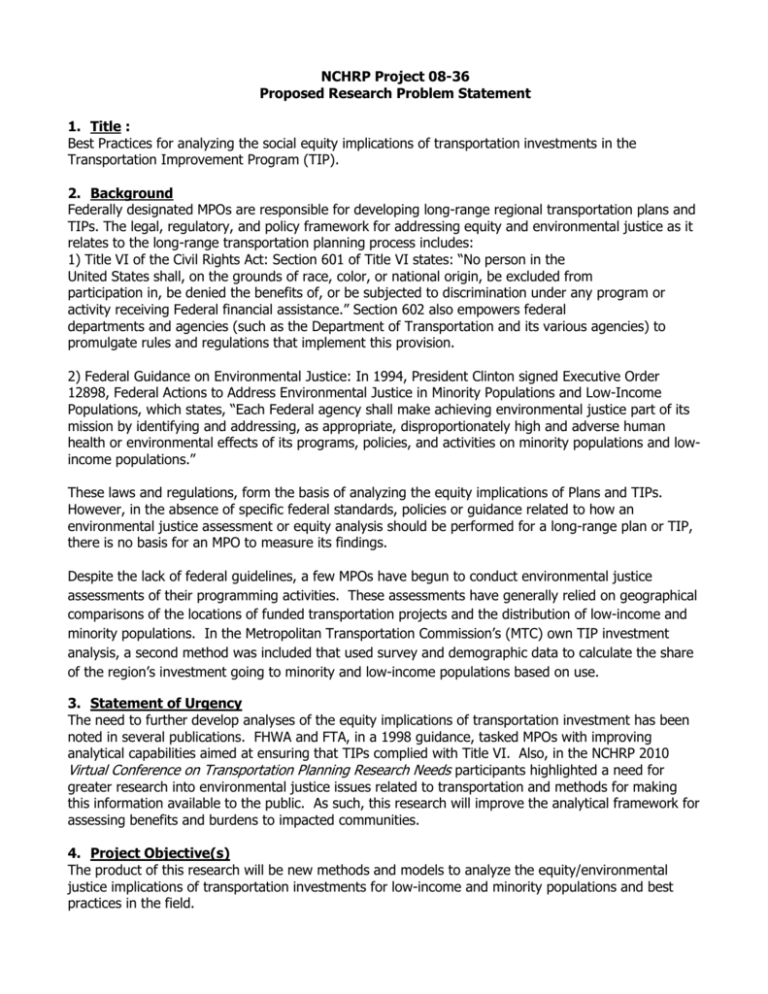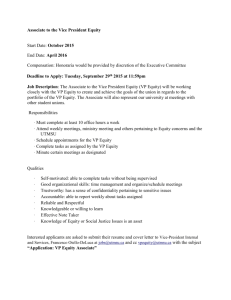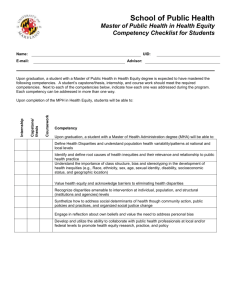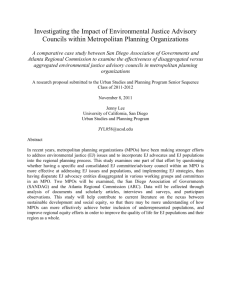NCHRP Project 08-36 Proposed problem statement_2
advertisement

NCHRP Project 08-36 Proposed Research Problem Statement 1. Title : Best Practices for analyzing the social equity implications of transportation investments in the Transportation Improvement Program (TIP). 2. Background Federally designated MPOs are responsible for developing long-range regional transportation plans and TIPs. The legal, regulatory, and policy framework for addressing equity and environmental justice as it relates to the long-range transportation planning process includes: 1) Title VI of the Civil Rights Act: Section 601 of Title VI states: “No person in the United States shall, on the grounds of race, color, or national origin, be excluded from participation in, be denied the benefits of, or be subjected to discrimination under any program or activity receiving Federal financial assistance.” Section 602 also empowers federal departments and agencies (such as the Department of Transportation and its various agencies) to promulgate rules and regulations that implement this provision. 2) Federal Guidance on Environmental Justice: In 1994, President Clinton signed Executive Order 12898, Federal Actions to Address Environmental Justice in Minority Populations and Low-Income Populations, which states, “Each Federal agency shall make achieving environmental justice part of its mission by identifying and addressing, as appropriate, disproportionately high and adverse human health or environmental effects of its programs, policies, and activities on minority populations and lowincome populations.” These laws and regulations, form the basis of analyzing the equity implications of Plans and TIPs. However, in the absence of specific federal standards, policies or guidance related to how an environmental justice assessment or equity analysis should be performed for a long-range plan or TIP, there is no basis for an MPO to measure its findings. Despite the lack of federal guidelines, a few MPOs have begun to conduct environmental justice assessments of their programming activities. These assessments have generally relied on geographical comparisons of the locations of funded transportation projects and the distribution of low-income and minority populations. In the Metropolitan Transportation Commission’s (MTC) own TIP investment analysis, a second method was included that used survey and demographic data to calculate the share of the region’s investment going to minority and low-income populations based on use. 3. Statement of Urgency The need to further develop analyses of the equity implications of transportation investment has been noted in several publications. FHWA and FTA, in a 1998 guidance, tasked MPOs with improving analytical capabilities aimed at ensuring that TIPs complied with Title VI. Also, in the NCHRP 2010 Virtual Conference on Transportation Planning Research Needs participants highlighted a need for greater research into environmental justice issues related to transportation and methods for making this information available to the public. As such, this research will improve the analytical framework for assessing benefits and burdens to impacted communities. 4. Project Objective(s) The product of this research will be new methods and models to analyze the equity/environmental justice implications of transportation investments for low-income and minority populations and best practices in the field. 5. Relationship to Existing Body of Knowledge This research will seek to improve upon current practice and develop an improved analytical framework for assessing benefit and burden to low-income and minority communities. The authors of “Equity Analysis of Land Use and Transport Plans Using an Integrated Spatial Model” (Mineta Trasportation Institute, College of Business, San Jose State University, February 2010, page 6) points to the lack of adequate equity analysis in transportation planning. In addition to the existing equity implications of the long-range plans, there are a few existing examples of the current practice for TIPs being used by MPOs, namely Capitol Region Council of Governments, Hartford, Connecticut Equity Assessment: FY2010-2013 Transportation Improvement Program, October 2009 Capital District Transportation Committee, Albany, New York Environmental Justice Analysis, March 2007 Mid-America Regional Council, Kansas City Region Transportation Improvement Program 2010-2014, October, 2009 6. List of Anticipated Work Tasks Research national best practices and recommend improvements to data collection and the analytical framework for equity and investment analyses by MPOs. 7. Estimate of Funds Needed $85,000 8. Estimate of Time Needed to Complete the Research One year 9. Name, Affiliation and Contact Information of Submitter(s) Sri Srinivasan, Ross McKeown Metropolitan Transportation Commission, Programming and Allocations Section 510-817-5793, 510-817-5842 ssrinivasan@mtc.ca.gov, rmckeown@mtc.ca.gov 10. Date of Submittal October 1, 2010 J:\PROJECT\Funding\TIP\Grants\NCHRP Project 08-36 Proposed problem statement_2.doc





